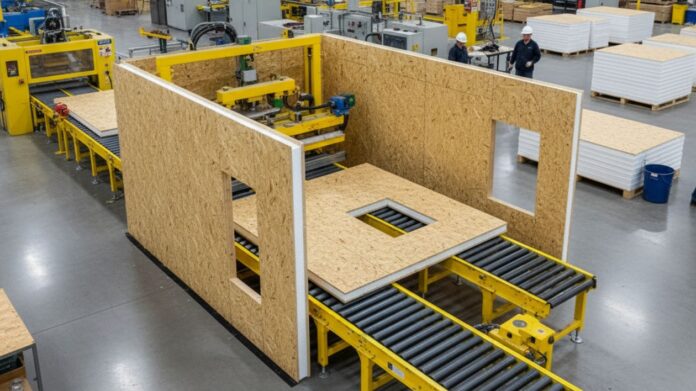The contemporary construction industry is more than ever becoming more dependent on speed, efficiency, and sustainability. Structural Insulated Panels (SIPs) have emerged as one of the best methods for meeting these expectations offering insulation, strength, and modularity as a single building element. These panels are backed by the latest production technologies that provide precision, quality, and scalability. An international industry player in this market is Gluestream,an international producer of complete cycle equipment used in the production of SIP and sandwich panels, and it operates in over 10 countries across all continents.
What Are SIPs and Sandwich Panels?
SIPs or structural insulated panels are composite construction materials that are made up of a rigid structural skin (such as oriented strand board (OSB), magnesium oxide board, or fiberglass-reinforced plastic (FRP)) over an insulating core; that insulating core can be made of expanded polystyrene (EPS), polyurethane (PU), or extruded polystyrene (XPS).
In the same way, panels can apply this layered principle to a wide range of applications with dissimilar skins (steel, aluminium, PVC, or laminate) and cores (foam, honeycomb, or mineral wool). These panels apply in the construction of energy-saving houses, industrial facilities, mobile homes, refrigeration units, and modular buildings.
The increasing popularity of SIPs and sandwich panels is explained by their remarkable strength-to-weight ratio, thermal performance, and installability, which are made possible by advanced manufacturing technologies.
Gluestream: A Global Leader in SIP Manufacturing Equipment
Gluestream offers entire machinery and production lines for SIP manufacturing and sandwich panel production. They have systems that involve all the stages of manufacturing, adhesive application, pressing, cutting, stacking, and packaging. The company’s equipment supports a wide variety of materials, including FRP, PVC, HPL, aluminium, and steel skins, with cores made of EPS, XPS, PU, and honeycombs.
They have the full-cycle equipment involving:
- Adhesive Application Systems: One and two-part PUR adhesive dispensers (automated).
- Panel Presses: Pneumatic and hydraulic presses to provide consistent pressure on the curing process.
- CNC Saws and Grooving Machines: These apply in cutting and making joints accurately.
- Automatic & Semi-Automatic Production Lines: Programmable to accommodate various production capacities and panel sizes.
Key Benefits of SIP Manufacturing Technologies
Investing in proper SIP/sandwich panel manufacturing equipment brings a range of benefits:
High Productivity
The automated systems enhance production in a remarkable way, and the quality of production remains the same. Using the right equipment, manufacturers can create hundreds of panels in a single shift, cutting project lead times by 40 or more.
Consistent Quality
High-level dosing of adhesives and managing the pressure make sure that the panels bond uniformly. The advanced application systems provided by Gluestream have high accuracy which leads to the production of defect-free, structurally sound panels.
Material Efficiency
Waste reduces through automated cutting and optimization of the planning of panel layouts to reduce the cost of raw materials and labor expenses.
Design Flexibility
Manufacturers can easily modify panel sizes, core materials, and skins to suit a particular project. The production lines can be set to almost any specification, whether it is small residential SIPs to large industrial sandwich panels.
Sustainability and Energy Efficiency
SIPs buildings have high thermal insulation and airtightness, which minimize heating and cooling expenses. Their light footprint also saves on the foundation needs, resulting in general savings and less carbon footprint.
Global Reliability and Support
Having production and service stations in over ten countries, Gluestream has 24/7 technical support, remote diagnostics, and on-site installation, and the organisation has guaranteed a steady, reliable operation across the globe.
Applications of SIP and Sandwich Panel Technologies
A large number of industries use SIP and sandwich panel manufacturing lines, including:
- Residential and Modular Construction: Pre-manufactured wall, roof, and floor panels of energy-efficient homes and modular residential housing units.
- Mobile Homes and Caravans: Lightweight and strong body panels of motor homes, trailers, and mobile offices.
- Industrial Buildings: Insulated metal factory, warehouses, and cleanroom panel.
- Cold storage and refrigeration: Refrigerated truck and storage facilities: temperature-controlled panels.
Through the advanced SIP manufacturing technologies, the builders are able to manufacture durable, thermally efficient, and cost-effective structures at a much faster rate as opposed to traditional materials.
Conclusion
As the construction industry continues to shift towards modular, prefabricated, and sustainable building solutions, SIP manufacturing technologies are becoming a necessity. They allow quicker building, high-energy efficiency, and high-quality accuracy, and reduction of costs and scrap.
Gluestream, with its full-cycle machinery and international expertise, enables manufacturers to create high-quality SIPs and sandwich panels that can be used in housing, industry, and transport constructions of the world. It is not merely investing in the development of new manufacturing technolog,y but the future of construction.






